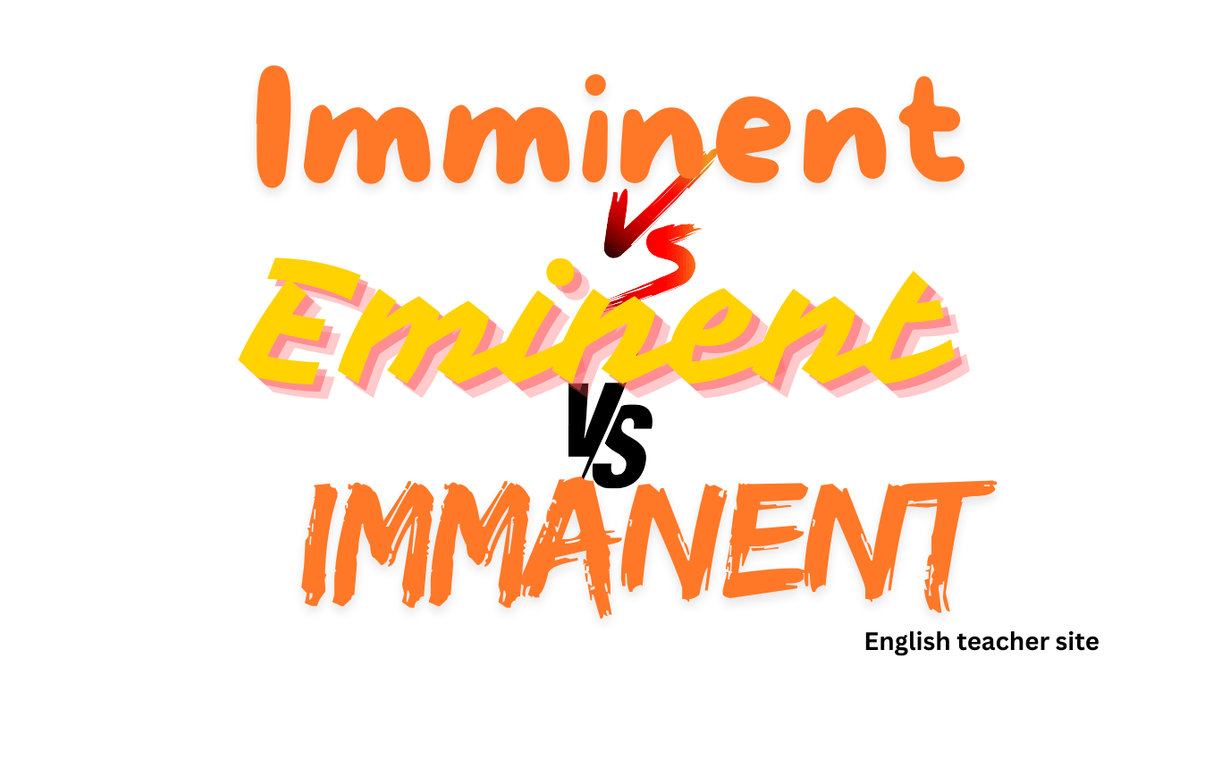Imminent Eminent Immanent: Understanding the Differences and Usage

- Eminent describes distinction and high standing in a particular context.
- Imminent indicates that an event or action is about to take place.
- Immanent is a term reflecting inherent or ingrained qualities, often in spiritual or philosophical discussions.
Eminent refers to a person or entity that is distinguished and well-respected, often used to highlight prominence in a particular field or society.
The term imminent is employed when referencing events or conditions that are about to occur or likely to happen soon. Its usage conveys a sense of urgency or impending action. On the other hand, immanent is a philosophical and theological term denoting an inherent or indwelling presence, often related to divine presence in the universe. The distinction between these terms is essential for precise expression, and remembering their particular uses can be aided by simple mnemonics based on their spelling and typical contexts.
What is the difference between eminent, imminent and immanent?
When discussing the English language and its nuanced vocabulary, it’s critical to remember that small spelling differences can result in substantial differences in meaning. This is particularly true for the adjectives eminent, imminent, and immanent, which are often mixed up due to their similar spelling and pronunciation. These words are not only important in general English but also in specific contexts like legalese and philosophy.
Eminent refers to a high rank or noteworthy quality in a person or object. It is derived from the Latin “eminere,” which means to stand out.
Imminent, on the other hand, is about time; it indicates that something is about to happen very soon. It comes from the Latin “imminere,” meaning to overhang or impend.
Immanent is somewhat more abstract, highlighting an inherent or all-pervading presence, particularly in a spiritual or philosophical context. This term originates from the Latin “immanere,” which means to dwell within.
Spelling and Usage
| Word | Definition | Example Sentence |
|---|---|---|
| Eminent | Distinguished; high in rank or status | An eminent scientist was awarded the Nobel Prize. |
| Imminent | Likely to occur at any moment; impending | Thunderclouds signal that a storm is imminent. |
| Immanent | Inherent; existing or operating within | God’s immanent presence is a tenet in many religions. |
In practice, these adjectives are not synonyms and cannot be used interchangeably without altering the meaning of a sentence. They are homophones, meaning they sound alike but have different meanings and spellings. It’s important to choose the correct vowel at the start of each word to match the intended meaning.
Mnemonics
To help remember which word to use, here are quick mnemonics:
- Eminent starts with an “E” for “Elevated” in prominence.
- Imminent starts with an “I” for “Impending,” related to time.
- Immanent starts with an “I” for “Inherent” within.
By understanding the unique applications and roots of these words, one can appreciate the richness and precision of English.
Imminent vs. Eminent vs. Immanent (Grammar Rules)
Imminent, eminent, and immanent are homophones, words that sound the same but have different meanings and spellings. They are often confused in writing, despite each having a distinct meaning. Mastery of their usage can enhance clarity and precision in English communication.
Imminent
Imminent refers to something that is about to happen very soon. It carries a sense of urgency and immediacy.
| Examples of Imminent | Incorrect Usage | Correct Usage |
|---|---|---|
| Approaching events | The eminent arrival of the guest. | The imminent arrival of the guest. |
| Pending incidents | Disaster is eminent. | Disaster is imminent. |
Eminent
Eminent describes a person or an entity that is distinguished, prominent, and stands out above others.
| Examples of Eminent | Incorrect Usage | Correct Usage |
|---|---|---|
| Notable individuals | An imminent scientist was awarded the Nobel Prize. | An eminent scientist was awarded the Nobel Prize. |
| Renowned places | The imminent landmarks of the city. | The eminent landmarks of the city. |
Immanent
Immanent is a term often used in philosophy and theology to discuss the inherent or inbuilt qualities or presence of a divine spirit or moral values within the physical world.
| Examples of Immanent | Incorrect Usage | Correct Usage |
|---|---|---|
| Inherent qualities | The eminent goodness in human nature. | The immanent goodness in human nature. |
| Divine presence | The imminent divinity in the universe. | The immanent divinity in the universe. |
To distinguish between these adjectives, consider their contexts: imminent is temporal and often carries a note of caution; eminent is qualitative, singling out superiority; immanent is more abstract, generally philosophical or spiritual.
- Imminent: about to happen, impending (The storm’s arrival is imminent.)
- Eminent: high in station, rank, or repute (She is an eminent historian.)
- Immanent: existing or operating within, inherent (Justice is immanent in the universe.)
By understanding the nuance of each word, one can use them correctly and effectively in both writing and speech.
Examples with Immanent
When one discusses immanent, they are referring to an inherent or intrinsic quality. This term is often used in philosophical and theological contexts to describe characteristics that are innate to an object or being. Unlike imminent, which forecasts the near occurrence of an event, or eminent, which signifies distinction, immanent is about the innate qualities. Here are some illustrative examples that capture its correct usage:
- In theology, believers may speak of an immanent divine presence, which suggests God is inherently present throughout the universe.
- Environmental ethics debates might center on the immanent value of nature, arguing that the natural world has worth in and of itself, beyond any utility to humans.
To contrast and clarify, the following tables present sentences using immanent and its easily confusable homophones:
Immanent in Use
| Correct Use of Immanent | Incorrect Use of Immanent |
|---|---|
| The artist believed in the immanent beauty of raw materials. | The artist believed in the eminent beauty of raw materials. |
| Scholars discuss the immanent characteristics of cultural narratives. | Scholars discuss the imminent characteristics of cultural narratives. |
Imminent and Eminent for Comparison
| Correct Use of Imminent | Correct Use of Eminent |
|---|---|
| The threat of thunder is imminent. | The scientist won an eminent award. |
| An imminent decision was expected from the board. | She was an eminent figure in her field. |
- Remember that immanence is a term signifying an internal and essential quality, such as the immanent spark of creativity in children.
In summary, immanent refers to that which is inherent or intrinsic to the nature of something. It is an attribute that pervades and sustains without external influence. Recognizing the subtle distinctions between immanent, imminent, and eminent is crucial for precise and effective communication.
Examples with Imminent
The word imminent, distinct from eminent and immanent, refers to something that is about to happen or is likely to occur very soon. It carries a sense of urgency and immediacy. One may encounter this term in various contexts, each illustrating its looming nature.
In Daily Communication
| Phrase | Usage Example |
|---|---|
| The storm is imminent | A warning that severe weather is on the horizon |
| Imminent deadline | A project due date is approaching rapidly |
These examples show how “imminent” operates in everyday scenarios, indicating the nearness of an event.
In News Reporting
News reporters often use “imminent” to convey the urgency of developing stories:
- Imminent disaster: to describe a natural catastrophe that is about to strike.
- Imminent threat: indicating that a risk to security is close at hand.
By bolding the word “imminent” in these contexts, its importance is underscored, highlighting the pressing nature of the events described.
In Literature
Authors employ “imminent” to set the stage for an impending action or climax:
- “The characters felt the imminent danger lurking in the shadows.”
- “She was aware of her imminent departure and the goodbyes it entailed.”
Literary use often involves a character’s perception of a forthcoming occurrence, emphasizing tension or anticipation.
“Imminent” is a word woven into the fabric of language that alerts the listener or reader to the presence of something on the verge of happening, whether it’s in casual speech, formal announcements, or creative narratives. Each usage serves to prepare for the event just around the corner.
Examples with Eminent
In the context of the English language, the term eminent refers to a person or thing that is distinguished, noteworthy, and stands out above others in a positive manner. It can be applied in various fields, such as academia, justice, arts, and literature. When used in a sentence, “eminent” often describes individuals who have reached a high stature due to their remarkable contributions or skills.
Here are a few sentences showcasing the use of the word eminent:
- Mary Shelley, an eminent author, is renowned for her classic novel, “Frankenstein.”
- The gala was attended by several eminent scientists who had shaped the landscape of modern physics.
In teaching the distinctions among imminent, eminent, and immanent, it proves helpful to provide students with examples that clearly demonstrate the unique usage of each term. Below, tables and bullet points are employed to clarify and distinguish “eminent.”
| Field | Eminent Individuals |
|---|---|
| Literature | William Shakespeare |
| Science | Marie Curie |
| Civil Rights | Martin Luther King Jr. |
- Science: Eminent physicists like Albert Einstein are often cited for their groundbreaking theories that changed our understanding of the universe.
- Human Rights: Nelson Mandela is celebrated as an eminent leader for his relentless fight against apartheid in South Africa.
| Descriptor | Example Usage in a Sentence |
|---|---|
| Accomplished | The award was presented to an eminent composer. |
| Illustrious | In legal circles, she is known as an eminent jurist. |
| Prestigious | The eminent panel of experts will judge the competition. |
Through these examples, the usage of “eminent” should become clearer to learners, highlighting its distinction from “imminent,” which relates to something about to occur, and “immanent,” which refers to an inherent or in-dwelling quality.
Synonyms of immanent, imminent, eminent
In exploring the English language, one encounters words like immanent, imminent, and eminent that, while sounding similar, have distinct meanings and contexts of use. Synonyms for these words add nuance and variation to communication.
Synonyms for “immanent”:
Immanent, meaning inherent or existing within, is often used in philosophical and spiritual contexts. Synonyms include:
- Inherent
- Intrinsic
- Indwelling
- Internal
- Built-in
For example, some believe that morality is an inherent part of human nature.
Synonyms for “imminent”:
Imminent, referring to something about to happen or impending, has several synonyms such as:
- Approaching
- Looming
- Pending
- Impending
- Near
A weather forecast might warn that a looming storm could bring heavy rain.
Synonyms for “eminent”:
Eminent denotes a person of high status or reputation. Words with similar meanings are:
- Distinguished
- Renowned
- Famous
- Celebrated
- Noteworthy
Many regard Marie Curie as a renowned scientist for her pioneering research.
| Synonyms for Immanent | Synonyms for Imminent | Synonyms for Eminent |
|---|---|---|
| Inherent | Approaching | Distinguished |
| Intrinsic | Looming | Renowned |
| Indwelling | Pending | Famous |
| Internal | Impending | Celebrated |
| Built-in | Near | Noteworthy |
Origin of Eminent, Imminent, and Immanent
Table 1: Origins and Definitions
| Word | Origin | Definition |
|---|---|---|
| Eminent | Latin: eminens | Distinguished, high in station or quality |
| Imminent | Latin: imminens | About to happen or looming |
| Immanent | Latin: immanens | Innate, inherent, or pervading the material world |
Table 2: Usage Examples
| Word | Example Sentence |
|---|---|
| Eminent | “She is an eminent scholar known for her expertise.” |
| Imminent | “They awaited the imminent release of the new book.” |
| Immanent | “The artist’s work explored the immanent beauty in everyday life.” |
Utilizing these words correctly can enhance communication and reflect an in-depth understanding of the English language. Each term, with its unique heritage, enriches the language’s descriptive capability.
Sources
1. Dictionary, https://www.etymonline.com/word/imminent.
2. Harper, Douglas. “Etymology of eminent. https://www.etymonline.com/word/eminent.
3. Harper, Douglas. “Etymology of immanent.” Online Etymology Dictionary, https://www.etymonline.com/word/immanent.
My name is Khamis Maiouf. I am the creator of the English Teacher Site, dedicated to providing valuable resources and insights for students around the world. With a passion for education and a commitment to helping students enhance their skills, I aim to make English teaching more effective and enjoyable for both educators and students.






